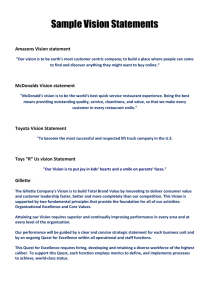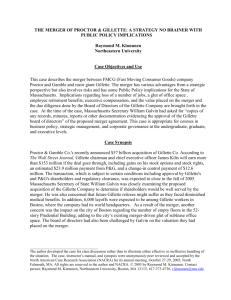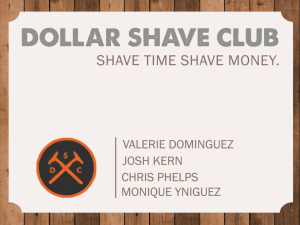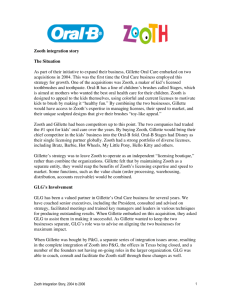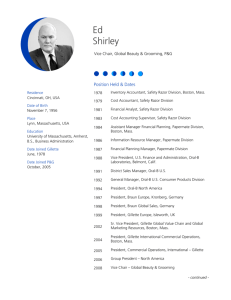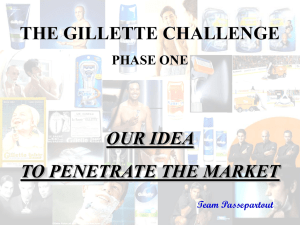File - Ryan Dresher E
advertisement
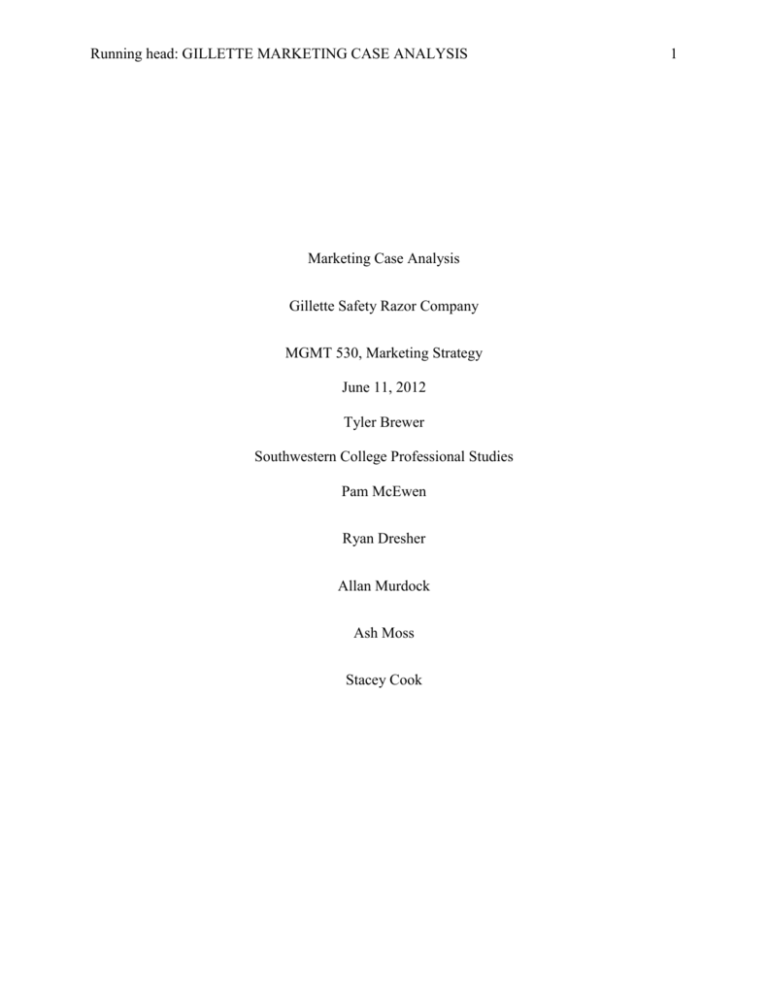
Running head: GILLETTE MARKETING CASE ANALYSIS Marketing Case Analysis Gillette Safety Razor Company MGMT 530, Marketing Strategy June 11, 2012 Tyler Brewer Southwestern College Professional Studies Pam McEwen Ryan Dresher Allan Murdock Ash Moss Stacey Cook 1 Running head: GILLETTE MARKETING CASE ANALYSIS Executive Summary Gillette is known around the world as the manufacturer of quality razors, shaving cream and other personal care products. This case study attempts to evaluate the past, current and future marketing elements of the company. An Introduction and Background, Marketing Management Profile, Competitive Profile, Environmental Opportunities and Threats Profile, Marketing Capabilities Profile, Proposed Marketing Strategies and, finally, a Conclusion will complete the analysis and show insight into the structure, ideas, and future possibilities of marketing strategy within the company. The challenges of a mature market and limited innovation opportunities and the strengths of brand loyalty and large existing market share are major topics of this analysis. At the conclusion, there will be a recommendation of a future marketing strategy for Gillette to consider. 2 Running head: GILLETTE MARKETING CASE ANALYSIS I. 3 Introduction/Background A. Company Business Profile 1. Domain Gillette targets globally in all demographics and specializes in the development of products in the following areas: Personal grooming, consumer portable power, stationery and small electrical appliances. 2. History Between the 1800s and 1900s, straight razors became very popular and coined the golden era of the straight edge razor. Men went to barbers to have their mustaches and beards trimmed. This American-European inspired style contributed to women shaving as well. The need to shave created an opportunity in 1901 for King C. Gillette to create the first safety razor with a replaceable blade. This razor was easy to control and resulted in fewer nicks and cuts. Patented on November 15th 1904, the safety razor soon overtook the high maintenance straight edge razor as a market leader. The safety razor’s popularity quickly favored the disposable razor giving rise to Gillette’s increased utility and success with little competition until Wilkinson Sword introduced the stainless-steel blade in 1962 (Ferrel and Hartline, 2011) .Thus, begun the razor wars. (See Appendix A 1901 -2010 Innovation Timeline) II. Marketing Management Profile A. Vision Statement The Gillette Company’s Vision is to build Total Brand Value by innovating to deliver consumer value and customer leadership faster, better and more completely than our competition. This Vision is supported by two fundamental principles that provide the foundation for all of our activities: Organizational Excellence and Core Values. Attaining our Vision requires superior and continually improving performance in every area and at every level of the organization. Our performance will be guided by a clear and concise strategic statement for each business unit and by an ongoing Quest for Excellence within all operational and staff functions. This Quest for Excellence requires hiring, developing and retaining a diverse Running head: GILLETTE MARKETING CASE ANALYSIS 4 workforce of the highest caliber. To support this Quest, each function employs metrics to define, and implements processes to achieve, world-class status (Proctor and Gamble, 2012). B. Mission Statement The Gillette Company is a globally focused consumer products company that seeks competitive advantage in quality, value-added personal care and personal use products. We compete in four large, worldwide businesses: personal grooming products, consumer portable power products, stationery products and small electrical appliances. As a company, we share skills and resources among business units to optimize performance. We are committed to a plan of sustained sales and profit growth that recognizes and balances both short- and long-term objectives. Our mission is to achieve or enhance clear leadership, worldwide, in the existing or new core consumer product categories in which we choose to compete (Proctor and Gamble, 2012). C. Value Statement As we work toward our Vision, three core Values define the way we operate. Achievement: We are dedicated to the highest standards of achievement in all areas of our business. We strive to consistently exceed the expectations of both external and internal customers. Integrity: Mutual respect and ethical behavior are the basis for our relationships with colleagues, customers and the community. Fair practice is the hallmark of the Company. Collaboration: We work closely together as one global team to improve the way we do business every day. We communicate openly and establish clear accountability for making decisions, identifying issues and solutions, and maximizing business opportunities (Proctor and Gamble, 2012). Running head: GILLETTE MARKETING CASE ANALYSIS III. 5 Competitive Profile A. Rank According to Proctor & Gamble, Gillette currently holds 71% of the global market. B. Weapons 2010 Gillette introduces Gillette Fusion® ProGlide™ and Gillette Fusion® ProGlide™ Power shaving systems. The breakthrough shaving technology of Gillette Fusion ProGlide includes blades with 15% thinner, finer blade edges that Effortlessly glide through hair and over skin for increased comfort. 2008 Gillette announces Gillettes Champion ambassador-baseball icon, Derek Jeter. 2007 Gillette announces that Tiger Woods, Roger Federer, and Thierry Henry will take on a role as brand ambassadors: the Gillette Champions. 2005 Gillette expands the M3Power line with the introduction of the sleek black and green M3Power Nitro, inspired by high performance vehicles. 2005 Gillette introduces MACH3 Comfort Gel, a shave gel with Anti-Friction properties to provide the best glide available. 2005 Gillette launches the Gillette Fusion® shaving system with manual and power razors and a complete line of pre- and post-shaving products. Gillette Fusion razors are the first to feature innovative technologies both on the front and back of the blade cartridge, with a five-blade Shaving Surface™ on the front of the cartridge and a Precision Trimmer on the back. 2004 Gillette introduces M3Power® – the first micro-powered wet shaving system for men – making it easier to shave more thoroughly with one easy power stroke (Proctor and Gamble, 2012). C. Competitive Structure Gillette’s competitive structure is pure competition. Long rivalries exist between Gillette, Schick and Bic all of whom carry a similar product mix. Niche competitors carry classic type straight razors, safety razors and classic style shaving creams, soaps and aftershaves. Running head: GILLETTE MARKETING CASE ANALYSIS IV. 6 Environmental Opportunities and Threats Profile (External Uncontrollable Elements) The Marketing Environment A. Opportunities and Threats Competitive Forces Opportunity: Gillette is now under the ownership and guidance of Proctor & Gamble. This has allowed the company to develop into the world’s premiere leader of grooming products as the company has used its leverage with P&G to develop marketing programs. Threat: Due to competitive saturation of the US market, Gillette must determine how to use its resources to capture more consumers by means of product-line extensions or marketing campaigns. Gillette’s razor war with Schick has left both companies with almost no new products to develop. Economic Forces Opportunity: During the economy woes of 2008, Gillette launched an advertising campaign that reminded consumers of the value possessed by Gillette’s products. Threat: Despite Gillette’s campaign, consumers used different brands due to their lower prices. As a result, Gillette lost some of its market share. Gillette may lost more market share as the economy is still shaky. Running head: GILLETTE MARKETING CASE ANALYSIS 7 Political Forces Opportunity: Gillette could take advantage of the US election coming up by supporting one of the candidates. Threat: Gillette could lose some of its market share if it supports a candidate that a consumer does not like. Legal and Regulatory Forces Opportunity: Gillette has the opportunity continue global expansion by entering into previously untapped markets. Threat: Laws and regulations may prevent Gillette from entering these markets as it may be an offense in some countries to shave or use body products due to consumer culture. Technological Forces Opportunity: Gillette could use technology, the internet, to obtain suggestions from consumers to determine how the company can advance. Threat: Due to the fact that the company has reached its level of maturity, seeking advice from consumers may result in a loss of resources. Sociocultural Forces Opportunity: Women in different areas of the world are beginning to shave as Americans do. Running head: GILLETTE MARKETING CASE ANALYSIS 8 Threat: These women may decide to buy a cheaper brand as they begin to realize that there is not much difference between Gillette’s product and the competition. B. Implication Statement Gillette is now under the control and direction of Proctor & Gamble. This has created an opportunity for the company as Proctor & Gamble serves 4.4 billion consumers around the world and is the multinational manufacturer of 50 leadership brands (Proctor and Gamble, 2012). This has provided Gillette with more leverage within the industry. Saturation of the US market has forced Gillette to expand in other areas. This includes Gillette’s global marketing campaign and its goal to enter into previously untapped markets. The world’s economy has resulted in a loss of income for the shaving leader. As a result, Gillette has addressed the situation by tailoring its advertisements to concentrate on price strategies. To date, the company has not become involved with any political forces. Gillette will need to be considerate of sociocultural and legal forces as global expansion is continued. Use of technological forces can assist in this regard. V. Marketing Capabilities Profile A. Strengths and Weaknesses Target Market(s) Identification Gillette targets globally in all demographics Target Market #1: Men over the age of 15 and women over the age of 13 in the US Strength: Within the US, 94 million men shave. 83% of these men prefer to wet shave with a razor. Within the US, 100 million women age 13 and up remove hair in some way. 94% of these women prefer the use of a razor blade (Ferrel and Hartline, 2011). Running head: GILLETTE MARKETING CASE ANALYSIS 9 Weakness: There is a lot of competition within this industry. Although, Gillette dominates the industry, the competition has provided products that perform as well as Gillette’s do but that are also more affordable. Target Market #2: Men and women living in countries outside the US Strength: 1.3 billion men shave worldwide. Technology has influenced women living outside of the US to begin shaving (Ferrel and Hartline, 2011). Weakness: 15% of men living around the world do not shave due to discomforts associated with shaving. 7% of men living around the world do not shave due to religious reasons and 3% do not care to shave. Gillette must consider this information when marketing globally (Ferrel and Hartline, 2011). Target Market #3: Sports fans Strength: Gillette has been able to reach a worldwide audience due to its sponsorship of athletic activities. 60% of Gillette’s sales is now generated outside the US. The company’s reputation and image has doubled as a result of this added exposure (Ferrel and Hartline, 2011). Weakness: A lot of these fans tend to purchase cheaper brands as there is a lot of competition within the industry. Marketing Mix Product Strengths: Gillette has expanded its product portfolio to include hair and body products in an effort to provide consumers with the full “shower experience.” The launch of these new products has resulted in an increase of market share and reinforced Gillette’s standing as the industry’s leader in male grooming. Running head: GILLETTE MARKETING CASE ANALYSIS 10 Weaknesses: The wet-shaving market has reached maturity and Gillette must find a way to hold on to its market share. Price Strengths: Gillette has a strong brand name. Some consumers are loyal to the brand and willing to pay more for the Gillette name. Weaknesses: Gillette’s products are typically higher than the competition’s. An example of this would be Gillette’s Fusion Power vs. Schick’s Quattro Titanium and Gillette’s own Mach 3..The razor is approximately $2 more and the cartridge refills are approximately $1 more per cartridge. According to Consumer Reports, Fusion is no better than the Mach 3. Yet, it costs considerable more. In addition, Gillette sales figures showed that the company was selling more razors than cartridge refills. Within the industry, razor manufacturers normally earn the majority of their income from the sale of cartridge refills (Ferrel and Hartline, 2011). Distribution Strengths: Gillette products are distributed globally and may be found in nearly store. Weaknesses: The competition is also available in these stores and consumers often buy their products over Gillette products. Running head: GILLETTE MARKETING CASE ANALYSIS 11 Promotion Strengths: Gillette has concentrated on promoting its products globally. As a result it has successfully blurred the lines of nationality, language, and ethnicity as consumers the world over become familiar with the Gillette brand. Globally, Gillette now holds 71% of the industry’s market share. Weaknesses: Sales with the US have slowed down and has resulted in a loss of billions of dollars. VI. Proposed Marketing Strategies A. Alternative 1 Capitalize on upcoming trends Pros Making use of what society has to offer, and capitalize on it, to insure that profits can continue. Market to what the population dictates. Be consumer friendly. Cons What society wants or what the next fad is to society, and integrating themselves in the fad. It may last a long time, or be a bleep in a short time. B. Alternative 2 Continued innovation Pros Use marketing innovations, and update the razor functions to improve quality to show the target markets that they are proven to bring quality to the consumer. Running head: GILLETTE MARKETING CASE ANALYSIS 12 Cons The costs associated with these actions could allow costs overruns in the marketing, and improvements through raw materials. C. Alternative 3 Listen to the voice of the customer through the web. Launch a new campaign to have the target markets give Gillette new ideas for razors, deodorants and bodywash and reward them heavily for it. Give them trips around the world, free products and cash. Pros Makes people want to get on and share ideas, especially for a chance to win a trip. Gets consumers thinking intimately about the product. Cons Will cost a lot initially. VIII. Conclusion A. What alternative was Selected In order to exceed the expectations of our external customers, as mentioned in the company’s value statement, Gillette must focus on, and understand, the voice of the customer. Alternative 3 most closely meets the marketing objectives of the company with regard to the marketing opportunities, threats, strengths and weaknesses. Given the saturation of the current target markets and the limited possibility of practical innovation, the voice of the customer will be the benchmark for future marketing strategy. With an aggressive campaign to understand what loyal customers and prospective customers need from Gillette, the firm will be able to more effectively delight those markets. Additionally, with the possibility of young European generations leaning on Western culture for future shaving styles, the culture should be well understood. Gillette should launch the campaigns globally. Running head: GILLETTE MARKETING CASE ANALYSIS 13 B. Will there be a different Marketing Concept Until now, Gillette has relied more on innovation and improvements in product mix to gain market share. Although there has most likely been some focus on feedback and customer surveys, a more aggressive campaign will be required to truly understand the consumer and his and her needs. Men and Women in many different cultures are customers of Gillette. With such a large target market, a marketing program to fulfill the requirements of understanding the voice of the customer is going to require a large investment in resources of capital and employees. The results of this campaign will be critical to the future of Gillette products and sales. C. Will there be a Revised Marketing Program and how will the plan be managed The marketing program will need to be revised by the Senior Marketing member of the company. This program should be reviewed and agreed on and fully supported by the rest of the Senior Leadership Team. Without the support of these key players, the marketing program may fizzle out early or be trumped in priority by other agendas. With the Senior Leadership Team driving the campaign and possibly even tweaking the mission and vision statements to more align with concerns about the voice of the customer, the marketing program will become culture within the company, changing the mindset of all Gillette employees to consider the customer in their everyday job duties. The program could be carried out in two parallel phases. The aggressive marketing campaign via the internet will bring in ideas and needs of the consumers and also understand more about the demographics, psychographics and habits of each target market, possibly even revealing new markets. The second, yet concurrent phase would be a campaign to align employees with the consumers needs and desires. This marketing program will effectively drive innovation with a purpose and practicality. Running head: GILLETTE MARKETING CASE ANALYSIS References Ferrell, O. C., & Hartline, M. D. (2011). Marketing strategy. (5th ed.). Mason, OH: Southwestern Cengage Learning. Proctor & Gamble. (2012). P&g. Retrieved from www.pg.com/en_US/company/index.shtml 14 Running head: GILLETTE MARKETING CASE ANALYSIS 15 Appendix A http://news.gillette.com/about/timeline Gillette Time line 2010 2010 Gillette introduces Gillette Fusion® ProGlide™ and Gillette Fusion® ProGlide™ Power shaving systems. The breakthrough shaving technology of Gillette Fusion ProGlide includes blades with 15% thinner, finer blade edges that effortlessly glide through hair and over skin for incredible comfort. 2000s 2000 2008 Gillette announces Gillette Champions ambassador—baseball icon, Derek Jeter. 2007 Gillette announces that Tiger Woods, Roger Federer, and Thierry Henry will take on a role as brand ambassadors: the Gillette Champions. more... 2005 Gillette expands the M3Power line with the introduction of the sleek black and green M3Power Nitro, inspired by highperformance vehicles. 2005 Gillette introduces MACH3 Comfort Gel, a shave gel with Anti-Friction properties to provide the best glide available. 2005 Gillette launches the Gillette Fusion® shaving system with manual and power razors and a complete line of pre- and post-shaving products. Gillette Fusion razors are the first to feature innovative technologies both on the front and back of the blade cartridge, with a five-blade Shaving Surface™ on the front of the cartridge and a Precision Trimmer on the back. 2004 Gillette introduces M3Power® – the first micro-powered wet shaving system for men – making it easier to shave more thoroughly with one easy power stroke. 2004 Running head: GILLETTE MARKETING CASE ANALYSIS Gillette introduces the Sensor3 refillable triple-bladed shaving system to the Sensor family of razors. 2003 Gillette introduces the premium triple-bladed Sensor3 disposable razor to the Sensor family of razors. 2001 Gillette introduces MACH3Turbo® featuring new blade edge technology that delivers the closest and most comfortable shave with less irritation, even when shaving against the grain. 1990s 1990 1998 Gillette’s MACH3® shaving system, the first triple-blade shaving system, "breaks the performance barrier." 1994 Gillette introduces SensorExcel featuring five flexible microfins for a closer shave. 1992 Gillette launches Gillette Series line of shaving products with its signature Cool Wave fragrance. 1980s 1980 1989 Gillette introduces Sensor, the first razor with spring-mounted twin blades. 1986 Gillette introduces the first disposable razor with a lubricating strip – Good News! Plus. 1985 Gillette introduces the first razor with a lubricating strip – Atra Plus. 1970s 1970 1977 Gillette introduces Atra, the first razor with a pivoting head. 16 Running head: GILLETTE MARKETING CASE ANALYSIS 17 1976 Gillette introduces Good News!, the first twin blade disposable razor for men. 1971 Gillette introduces Trac II, the first twin-blade shaving system. 1960s 1960 1969 Gillette introduces platinum chromium coating of blades, designed to enhance corrosion resistance. 1963 Gillette introduces a coated stainless steel blade – Gillette Super Stainless. 1960 Gillette introduces the Super Blue Blade featuring a silicone coating. 1950s and Earlier 1950 1957 Gillette introduces an adjustable razor with three settings – for light, medium and heavy beards. more... 1946 Gillette introduces the first blade dispenser –the Gillette Blue Blade Dispenser – and eliminates the need to unwrap blades. more... 1938 Gillette introduces the Gillette Thin Blade. 1932 Gillette introduces the Gillette Blue Blade. 1904 Running head: GILLETTE MARKETING CASE ANALYSIS Gillette receives the first U.S. patent on the safety razor, sales soar to 90,000 razors and 12 million blades. more... 1903 Gillette manufactures the first safety razor. By year’s end, Gillette sells 51 razor sets and 168 blades. more... 1901 King C. Gillette invents the safety razor with disposable blades. more... (Ferrel and Hartline, 2011) (Proctor and Gamble, 2012) 18
